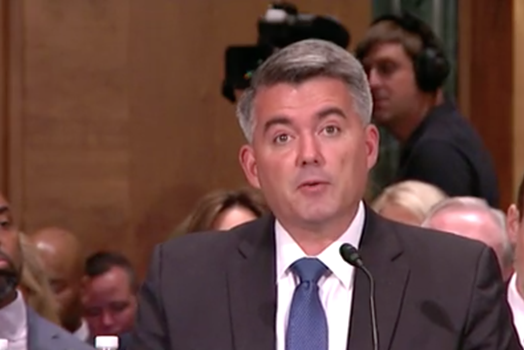The push for federal cannabis banking legalization took another baby step on July 23, when the U.S. Senate Committee on Banking, Housing and Urban Affairs heard a bill that would allow financial institutions to serve companies connected with cannabis, which is still federally illegal.
Introduced by Senator Jeff Merkley of Oregon, the SAFE Banking Act would protect banks and other financial outfits from federal charges if they provide accounts, loans and other services to pot businesses as well as ancillary enterprises that work with cannabis-focused enterprises, such as real estate agencies, accountants and other business vendors.
Merkley's bill mirrors the original measure in the House of Representatives, which Representative Ed Perlmutter has been pushing since 2013. Perlmutter's version of the SAFE Act passed the House Financial Services Committee in March, 45-15, and is awaiting action on the House floor.
Although the Senate committee didn't vote on the proposal (several committee members were absent or left early because of other hearings), it did hear hours of testimony from people in the cannabis and banking industries, as well as Merkley and Colorado Senator Cory Gardner. While Gardner had opposed Amendment 64, which legalized recreational pot in this state in late 2012, he said that he believes lawmakers need to accept the public's growing acceptance of the plant.
"There's been a dramatic shift in Americans' views on cannabis in recent years. ... In a time when all the talk is about how divided we are within the country, we are remarkably united on this issue. It's happening in the bluest of blue states, the reddest of red and, in Colorado, the purplest of purples," he told his fellow senators on the committee. "Last year alone, Michigan, Missouri, Oklahoma, Utah and Vermont all adopted or expanded marijuana programs. In short, it's the states that are leading on the issue, and the federal government has failed to respond. It has closed its eyes and plugged its ears, and pretended and hoped the issue would just go away. But it won't."
According to Gardner, 47 states have legalized some form of medical or recreational marijuana, but the vast majority of banks and financial institutions don't want to touch cannabis money out of fear of being hit with federal trafficking charges, because the plant and its derivatives are still a Schedule I substance. As a result, the pot industry is largely cash-only, despite legal marijuana accounting for over $8 billion in sales nationwide in 2017, with sales predicted to reach $25 billion by 2025.
Colorado input at the hearing didn't stop with Gardner. LivWell Enlightened Health CEO John Lord, who owns the third-largest dispensary chain in the state, told senators that his company employs around twenty security guards because of how much cash the facilities contain, and the costs continue to snowball.
"I rented out a former bank building just so that I could use the vault to store cash. Another time, I had no choice but to travel to the Internal Revenue Service office in Denver with more than $3 million in cash in order to send the federal government our taxes from our state-legal cannabis business," he testified. "The current situation is especially challenging for small businesses. While we, due to our size, are able to absorb the additional costs associated with cash management and exorbitant bank fees, many mom-and-pop businesses are not."
Banking representatives from Oregon and Colorado also expressed their frustrations, detailing the challenges of operating in states that have retail pot. Citywide Banks CEO Joanne Sherwood told the committee that her Colorado-based bank won't serve cannabis-related clients until the federal government provides solidified legal protection.
"Voters have made it clear [that] the issue is not going away. For banks, that means any person or business that derives any revenue from a cannabis firm, including real estate owners, security firms, utilities, vendors, employees of cannabis businesses as well as investors, is violating federal law," she explained.
The three states without any form of legal cannabis — Idaho, Nebraska and South Dakota — are also at risk, she added. Ancillary businesses such as payroll services or human resources software from across state lines routinely serve cannabis businesses, and that will only increase as indirect pot revenues expand. "Even banks in states like Idaho and Nebraska, where cannabis has not been legalized for any purpose, still face compliance challenges that must be addressed," Sherwood said.
In May, the attorneys general of 38 states and territories, including Colorado AG Phil Weiser, sent a collective letter to congressional leaders urging them to pass the SAFE Banking Act.
Still, not everyone at the hearing was ready to move forward. Garth Van Meter, legislative affairs director for anti-legalization group Smart Approaches to Marijuana, told the senators that Congress should figure out the federal future of cannabis before legalizing banking and opening up the industry for further investment.
"By skipping ahead to a technicality over banking rules, the marijuana industry is hoping to gain the many benefits of federal legalization without a debate over the public health effects," he said, adding that banks "want to have it both ways" by being able to use legal pot's money without taking a stance for or against legalization.
Minnesota Senator Tina Smith, who hasn't supported past cannabis reforms, said that she wanted to see more advancement in civil-justice reform surrounding cannabis convictions before making life easier for commercial operators. "I think that it would be wrong for Congress to act to protect business interests without also considering what we need to do to erase the unjust suffering caused by our criminal justice policies," she told her colleagues.
The meeting ended without setting a date for a committee vote.
[
{
"name": "Air - MediumRectangle - Inline Content - Mobile Display Size",
"component": "12017618",
"insertPoint": "2",
"requiredCountToDisplay": "2"
},{
"name": "Editor Picks",
"component": "17242653",
"insertPoint": "4",
"requiredCountToDisplay": "1"
},{
"name": "Inline Links",
"component": "18838239",
"insertPoint": "8th",
"startingPoint": 8,
"requiredCountToDisplay": "7",
"maxInsertions": 25
},{
"name": "Air - MediumRectangle - Combo - Inline Content",
"component": "17261320",
"insertPoint": "8th",
"startingPoint": 8,
"requiredCountToDisplay": "7",
"maxInsertions": 25
},{
"name": "Inline Links",
"component": "18838239",
"insertPoint": "8th",
"startingPoint": 12,
"requiredCountToDisplay": "11",
"maxInsertions": 25
},{
"name": "Air - Leaderboard Tower - Combo - Inline Content",
"component": "17261321",
"insertPoint": "8th",
"startingPoint": 12,
"requiredCountToDisplay": "11",
"maxInsertions": 25
}
]













